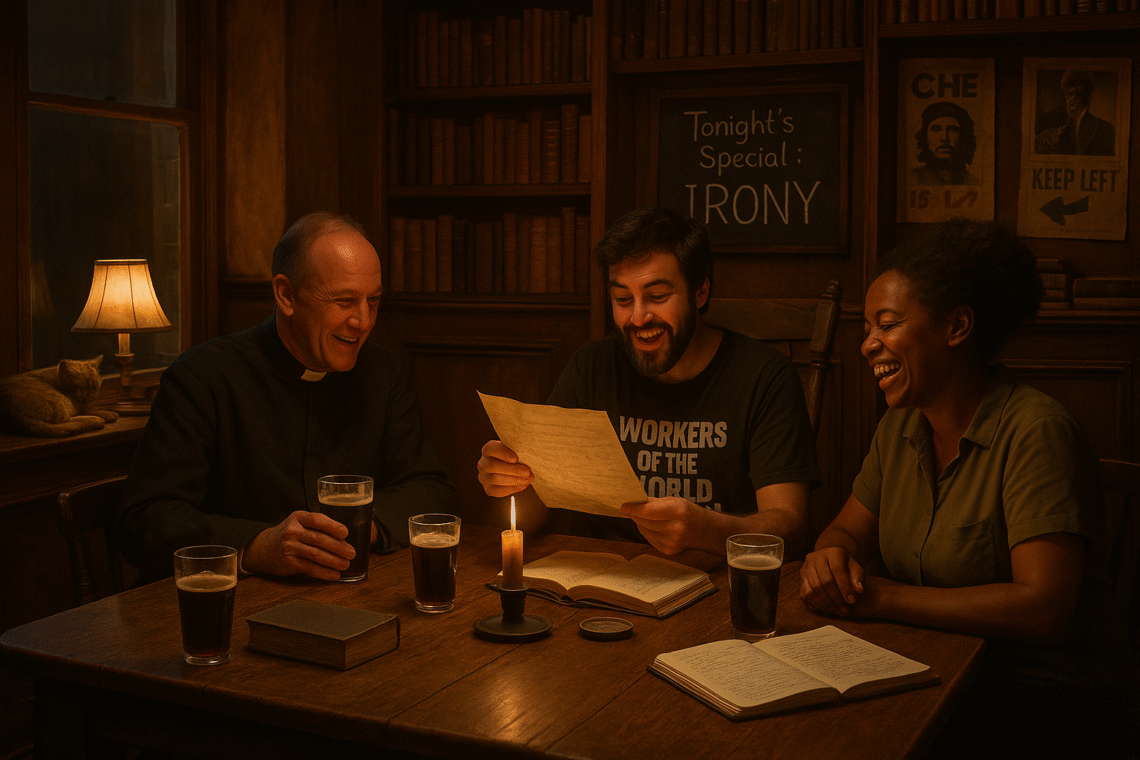On Satire, Subversion, and Speaking Truth.
Somewhere between the pulpit and the pub, I first learned the disarming power of satire. The pulpit told me to mind my words; the pub taught me to sharpen them. Somewhere in the laughter, between theology and ale, I discovered that humour, especially the wry, uncomfortable kind, could say what solemn speech could not.
I still remember a particular pub evening during my postgraduate days. A haphazard group of students, poets, priests, and one very bitter political theorist, had gathered under the excuse of disputing Aquinas but soon found themselves parodying the Vice-Chancellor’s latest administrative memo. With just the right measure of wit and wickedness, someone read it aloud in the style of Monty Python’s Ministry of Silly Walks. We laughed until the landlord came to hush us. But when the laughter faded, we were left with something more serious: a shared sense that truth, particularly the awkward, institutional kind, had been exposed by ridicule more effectively than any formal protest might have.
Satire, when it is good, is not merely jest. It is resistance in drag. It tells the truth dressed as entertainment, and that’s precisely what makes it powerful, and dangerous.
Historically, satire has been the lingua franca of those without power. Aristophanes could scold Athens more freely in a comedy than a statesman could in the Assembly. Jonathan Swift’s A Modest Proposal, as outrageous as it was, struck harder than any economic treatise. And our own times have not lacked for comedians whose barbed routines carried more moral weight than the solemn declarations of elected officials.
The satirist performs a paradox: they say what cannot be said, by pretending not to mean it. They are, in a way, sacred fools, licensed to speak dangerous truths under the cover of absurdity. The jester in the medieval court was the only one who could mock the king’s decisions without losing his head, precisely because everyone pretended not to take him seriously.
But satire has always been a fragile freedom. In times of great insecurity or rising authoritarianism, the public appetite for irony dwindles. Those in power grow thin, skinned. And ordinary people, afraid of being misread or cancelled, begin to doubt whether laughter is worth the risk.
We now live in an era that is, oddly, both hyper-ironic and dangerously literal. Online, irony often becomes a shield for cruelty, “just joking” used to justify the indefensible. But offline, satire seems increasingly endangered. The nuance required to land a joke with moral weight, the ability to trust that audiences will “get it,” is eroding. In a world of bad, faith interpretation and clickbait culture, the satirist risks being misunderstood, or worse, understood all too well by the wrong crowd.
What happens when we lose our jesters?
We risk becoming solemn to the point of suffocation. We lose the capacity to name hypocrisy without sounding self-righteous. And we surrender one of the most ancient tools of prophetic speech.
Because let’s be clear: satire, at its best, is prophetic. The Hebrew prophets themselves often deployed biting ridicule, think of Elijah mocking Baal’s priests (“Perhaps he is relieving himself?”) or Jesus referring to the Pharisees as “whitewashed tombs.” These were not mere insults. They were carefully calibrated provocations meant to jolt, to awaken, to reorient.
To forbid or forget satire is to weaken our moral immune system. It is to choose civility over conscience. And while we must guard against cruelty disguised as comedy, we must equally guard against control disguised as civility.
And so we come to the question: what now?
How do we preserve this peculiar form of truth, telling in a culture that is increasingly either too literal to laugh or too hostile to nuance?
We must begin by recovering our appetite for discomfort. True satire always unsettles, even when we agree with its target. It invites us to laugh at ourselves, and that, I suspect, is its deepest gift. In a world of ideological armour, self-mockery may be the last act of moral disarmament.
We must also protect spaces where wit can flourish, not just online, where algorithms prefer outrage over irony, but in classrooms, congregations, cafés, and yes, pubs. Spaces where complexity can breathe, and humour can stretch its legs without fear of cancellation.
Finally, we must resist the urge to take ourselves too seriously. That, after all, is the satirist’s ultimate aim: not to destroy but to deflate. To remind us that truth, like a balloon, may rise best when not overfilled.
So here, my friends, is your modest proposal.
Find a piece of satire, an old political cartoon, a biting monologue, a forgotten essay, that still stings with truth. Read it. Share it. Reflect on it. And perhaps, if the mood strikes, write your own.
Do not fear to jest, especially when the truth grows heavy.
Sometimes, laughter is the only honest sound left in the room.





